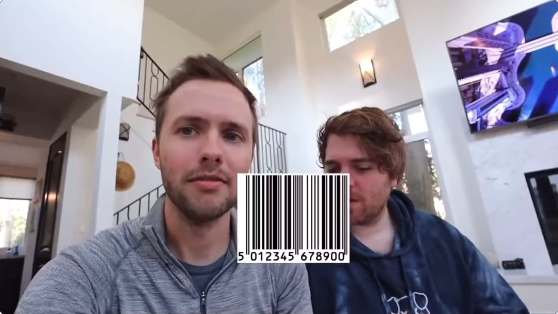A recent viral video clip of two homosexual-identified YouTubers discussing the beginning stages of purchasing children through In Vitro Fertilization (IVF) and surrogacy has been making the rounds on social media.
The video is of 34-year-old YouTuber Shane Dawson and his 31-year-old “husband,” Ryland Adams, who were “married” in Colorado in early 2023.
Dawson has over 30 million subscribers, and since launching his YouTube channels in 2008, he has garnered a combined 4.48 billion views.
In the clip, Dawson and Adams film themselves going through the results of the 12 embryos they have created through IVF, six each from Dawson and Adams.
“There are only two girls, and four boys,” Dawson says, speaking of his “results.” He adds, “That’s a lot of boys.”
Then, Adams reveals that his “results” show four girls and two boys. “So, we’re opposite,” Adams comments.
He then adds, “It’s so weird too because our babies have barcodes” (emphasis added).
Dawson, commenting on the number of embryos they have created, jokes, “It’s cheaper by the dozen, baby.”
Subsequently, Adams says, “I’m curious though. I want to talk to our doctor and know, of the four boys, which boy do we choose?”
Dawson’s mouth drops open, and he jests, “I don’t like playing God.” He then holds up a small wheel with different sides, and comments while laughing, “Let’s spin the wheel and we’ll put a barcode on each side.”
You can watch the full minute-long clip here:
YouTuber Shane Dawson and his husband are in the beginning stages of buying a baby through surrogacy and they’ve created 12 embryos. The way they talk and joke about it is disturbing all while saying they “don’t want to play God”. pic.twitter.com/dZAhZKsR2g
— 🪴 Catholic Charm ✞ 🪴 (@CatholicCharm) March 1, 2023
Katy Faust, founder of the non-profit children-rights organization of Them Before Us, and author of a book with the same name, Them Before Us: Why We Need a Global Children’s Rights Movement, commented on the video on Twitter.
Responding to Dawson’s comment, “Our babies have barcodes,” Faust replied:
Yes. Because you have made them products.
There are a myriad of ethical problems going on in this video. Because male homosexual couples are in an inherently sterile relationship, they must rely on two modern procedures to produce children: fertilization of an egg outside the womb (IVF) and the transfer of embryos into a surrogate womb.
When IVF is used by homosexual couples to create children, the rights of these children to have a mother and a father are violated.
In Them Before Us, Faust points out that “using a sperm and/or egg donor ensures that the child will grow up missing a vital biological connection to his or her mother or father in order to serve the commissioning adult’s desire for a biological connection.”
Faust cites the story of one donor-conceived woman who wrote about her experience:
I am donor-conceived, I’m happy to be alive, but I would never wish this on my worst enemy in a million years. I wanted to have a father. I never had a father.
Another donor-conceived individual writes:
I cannot put into words the pain of not knowing who my biological mother is and not being able to have/have had a relationship with her. I really do think about this at least once a day, and it is deeply mentally, emotionally, and psychologically troubling.
Another grave moral problem is introduced when embryos that are created through IVF are either frozen in time, for possible future use, or just discarded as medical waste.
That’s what Dawson and Adams ask: Which babies do we keep, and which do we discard?
Focus on the Family’s position regarding IVF is that its moral concerns can be lessened by three factors: when it is used by a married couple with no outside egg or sperm donors, when the embryo is implanted in the wife’s uterus and when no “extra” embryos are frozen or discarded.
In addition, gestational surrogacy – or the practice of a woman “renting” her womb to be used for a child that is not biologically her own – introduces yet another layer of moral problems.
As of 2022, the global commercial surrogacy industry is worth an estimated $14 billion. It’s expected to rise to a staggering $129 billion by 2032.
Children born of a surrogate mother lose out on the right to know their birth mother. Surrogacy is not like renting an apartment. A birth mother and preborn child develop an intimate biological, emotional and physical connection – a connection that is severed the moment the surrogate gives birth and the infant is handed off to the purchasers.
As Faust points out, “Birth is intended to be the continuation of the mother-child bond, not the moment an intentional primal wound is inflicted.”
In reflecting on the video, Andrew T. Walker, a Christian Ethics Professor at the Southern Baptist Theological Seminary, pointed out that this video demonstrates the consequences that have developed as a result of “homosexual marriage.”
“Gay marriage harms no one,” they said (except the human beings who will be denied a mother or frozen for an indeterminate amount of time). God forgive us for tampering with human nature and making children the slave of adult-centered selfishness.
And as Faust writes, “Sometimes the answer to an adult’s desire to have a child is a hard no.” That is, in the case of IVF and surrogacy utilized by homosexual couples, it should be a hard no.
Related articles and resources:
Perspectives on Surrogate Motherhood
Photo from Twitter.






